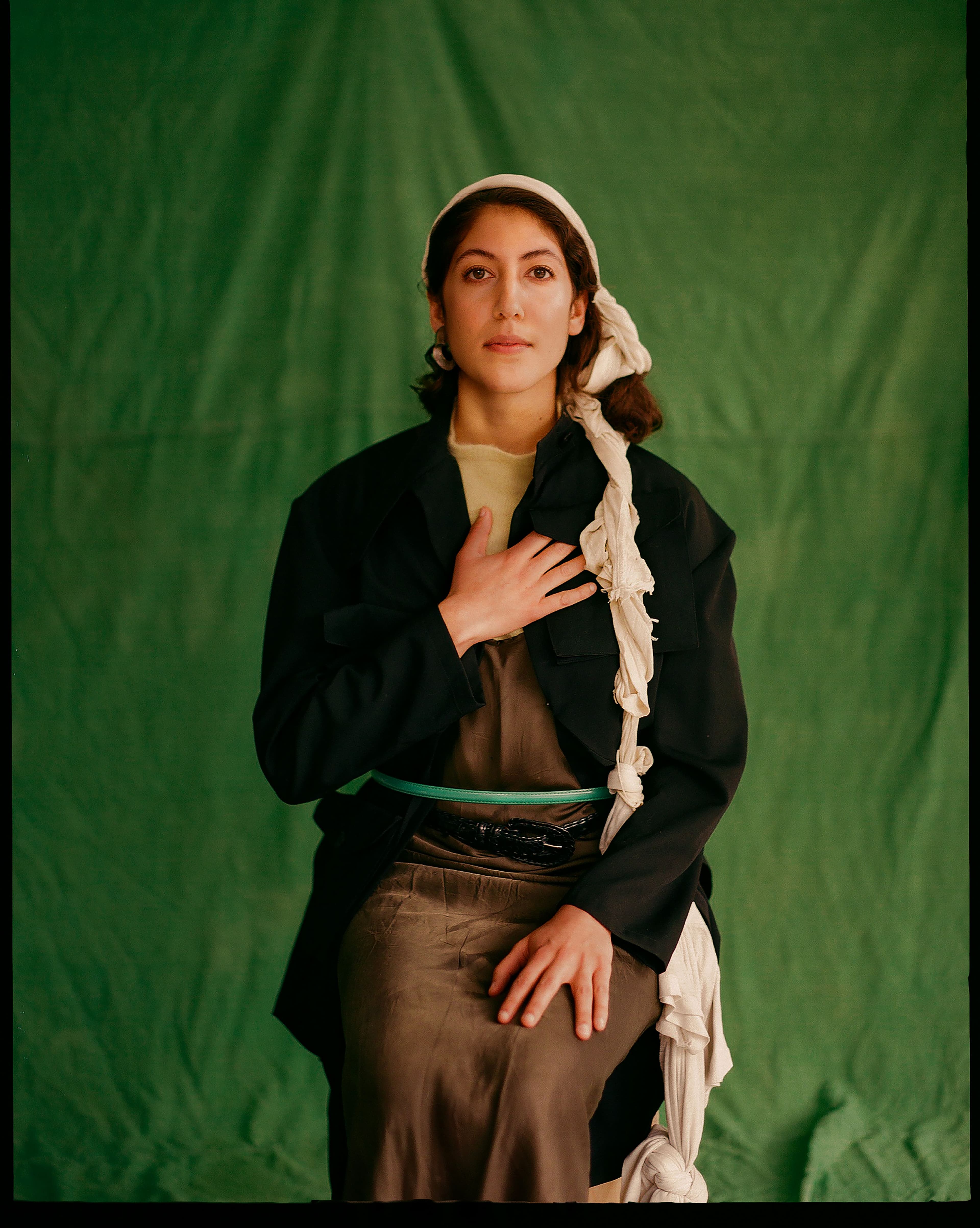
Coat and earring, stylist’s own. Dress by Organic by John Patrick. Vintage top and belts from Fairgrounds and Fancy. Vintage t-shirts, worn on head, from Mothfood.
Generation Next: Elana Sulakshana
Growing up in the Boston area, 25-year-old Elana Sulakshana was exposed to activism from a very young age, attending labor rights and anti-Iraq War protests with her parents. “I kind of grew up with an understanding of what it takes to build collective power and make change in the world,“ she reflects. The climate crisis—as with so many of us over a decade ago—was not yet at the top of the agenda. “It wasn’t until I was in high school and spending time in South India in Chennai, where I have family, when I started to understand the interconnectedness of climate change,“ says Sulakshana. “In the early Inconvenient Truth days, it wasn’t often framed as a social justice issue. The solutions that they offered were so unsatisfactory, like change your lightbulb. Being in Chennai, I started to understand the impacts on communities—Chennai is a city now that is running out of water.“
That summer changed the course of Sulakshana’s activism and life. She returned to Boston seeking to address climate change on a structural level, getting involved in local grassroots activism before heading to Columbia University, where she worked with other young activists on the fossil fuel divestment campaign. “From that work of fighting at this one endowment level, I started to understand the importance of money in propping up the fossil fuel economy and I was itching to work at a bigger scale,“ she says. “That brought me to these campaigns on banks, on insurance companies. What are the big players here?“
Today, Sulakshana has taken these experiences and energy to Rainforest Action Network, where she works alongside communities and activists to hold the insurance industry accountable for its role in propping up fossil fuels through policies and investments. Her work ranges from protesting and getting arrested blockading a building, doing outreach to employees at various companies to inform them of the actions of their employers, developing research and policy recommendations, engaging directly with insurance executives, or, lately, trans-continental digital protests—like a digital rally targeting insurance brokerage company Marsh, which provides services to Australia’s proposed Adani Carmichael coal mine on Wangan and Jagalingou land. “Hundreds of people joined the online rally and I spoke about the importance of their fight to shifting their insurance industry,“ says Sulakshana. “There were baby kangaroos on the call. We got to connect with activists in Australia and other parts of the world and we took action together on the call to figure out how to reach the decision makers.“
“We’ve really been trying to find ways to build community when we can’t do so in person,“ Sulakshana adds. “Underpinning these campaigns is a grassroots movement, relationships between people and communities. It’s been hard and isolating in ways to not be able to gather.“ The work is multi-layered but not without victories—the divestment campaign with Columbia was won the week we spoke. “I think so much of this work is about fighting back against the things that we don’t want and protecting land and water, being on the defense against these destructive extraction projects,“ muses the activist, who is based in Seattle and also engages in issues of mutual aid and diverting police funds to invest in energy efficiency, affordable housing, and low-carbon technologies in her local community. “There is also the flip side: What is the economic system that we want to build? What would an alternative financial system that is based on care for one another and for the earth be? There are small-scale and bigger-scale models of that emerging, like public banks and cooperative networks. I live in a cooperative house that is a part of a land trust and in my every day, I’m trying to learn and practice what living in [a more empathetic and sustainable structure] could mean.“
Still, Sulakshana recognizes that her battle is merely one front in the struggle for environmental justice. “This is one lever in the fight for the climate crisis, not the silver bullet,“ she says. “We are increasingly bringing people into the movement through this lens. It’s a way that everyone can show up and take action.“
Read this story and many more in print by ordering our inaugural issue here. See the full Generation Next series here.
As a nonprofit arts and culture publication dedicated to educating, inspiring, and uplifting creatives, Cero Magazine depends on your donations to create stories like these. Please support our work here.






